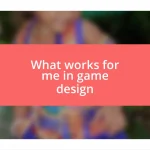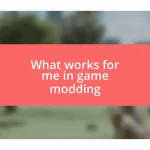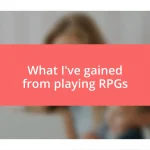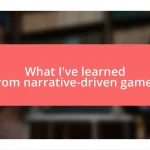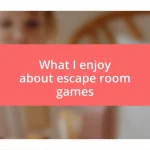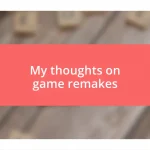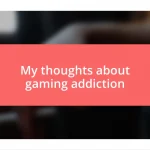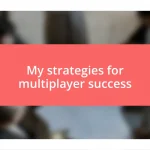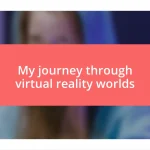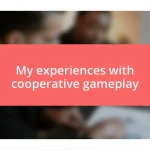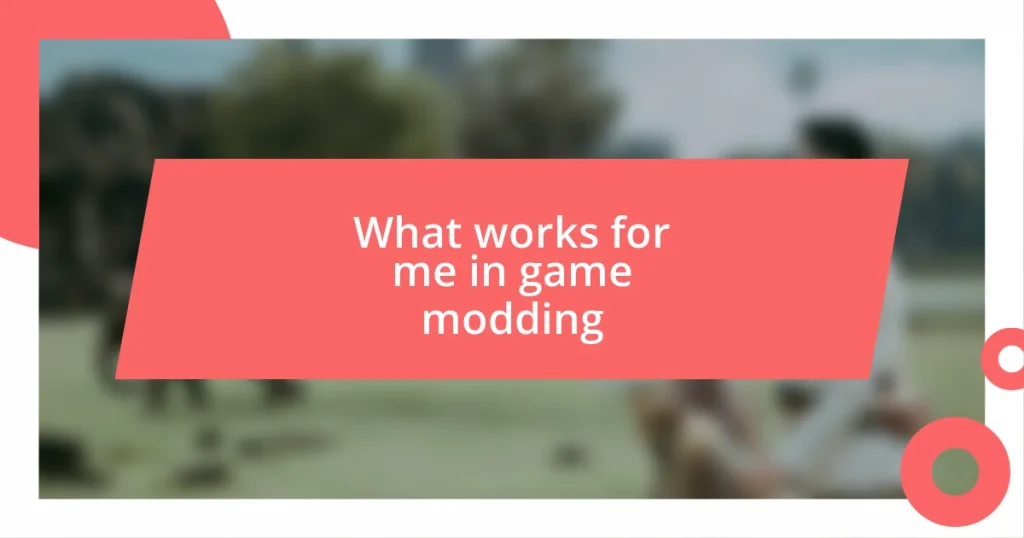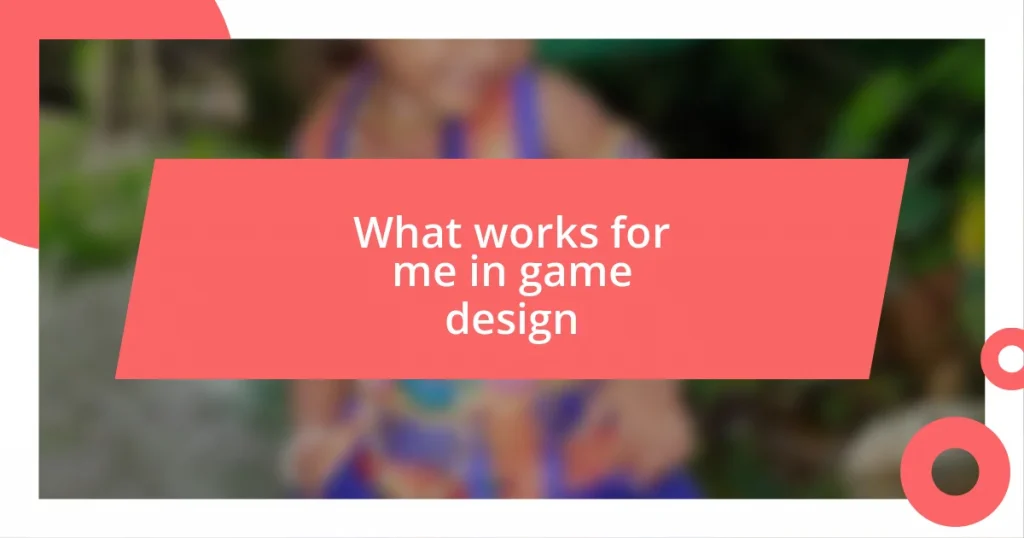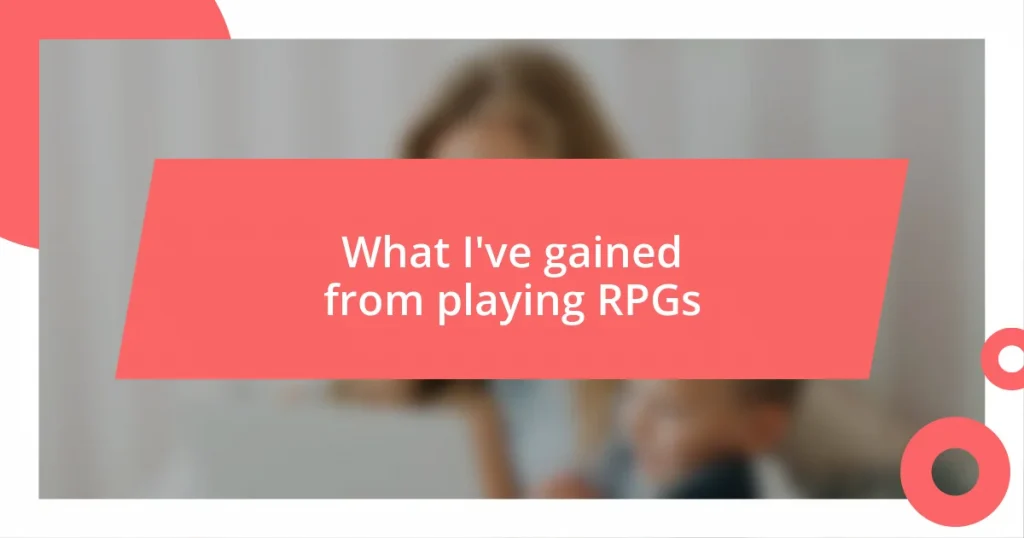Key takeaways:
- Game modding empowers players to customize their gaming experiences, with a variety of mods ranging from simple edits to complex overhauls.
- Engaging with modding communities fosters collaborative learning, skill development, and inspiration while providing valuable feedback and resources.
- Systematic testing and promoting mods in online communities enhances visibility, engagement, and ultimately the modding experience.
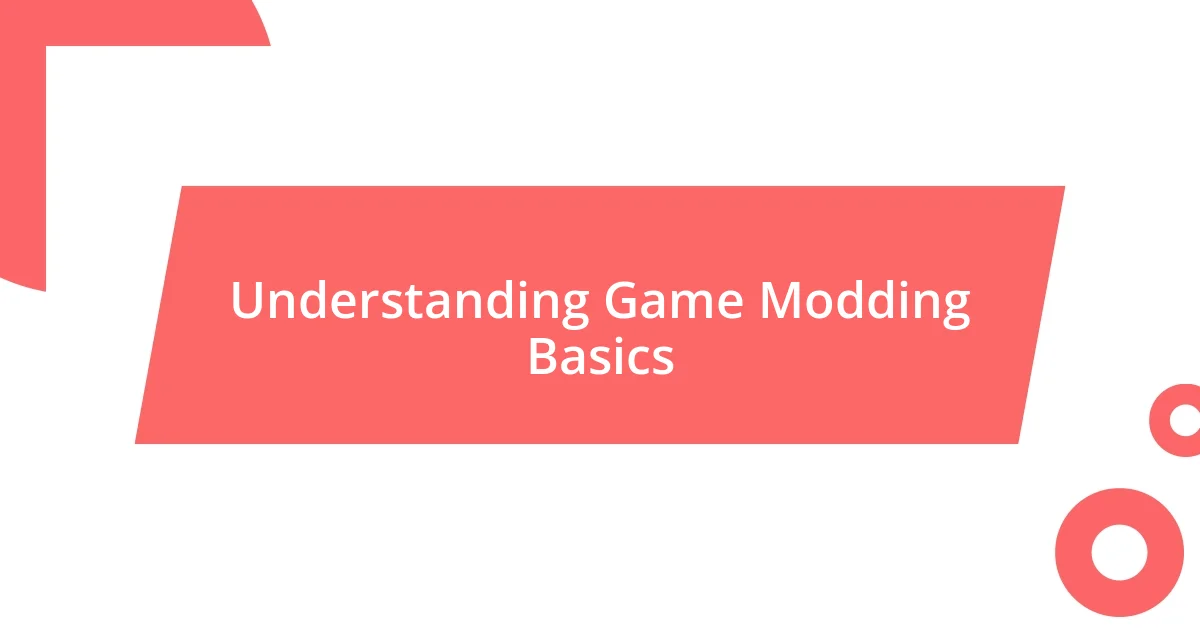
Understanding Game Modding Basics
Game modding, at its core, is the art of altering or adding to a game’s content. I remember the first time I dove into modding; the thrill of customizing my favorite game to fit my vision was electrifying. It wasn’t just about changing textures or adding new characters; it felt like I was stepping into the shoes of a creator, shaping an experience that resonated with my gaming style.
Understanding the basics involves recognizing the variety of mods available. From simple graphical enhancements to complex gameplay overhauls, each mod opens a new avenue for exploration. Have you ever wondered how certain mods transform a game into something almost unrecognizable? For me, discovering a well-crafted total conversion mod was like entering a new dimension—suddenly, familiar places felt foreign and exciting.
You don’t need to be a coding genius to start modding, but a little technical curiosity goes a long way. I recall my initial hesitance—could a simple change really impact my gameplay? After taking the plunge and experimenting with a few user-friendly tools, I found that each adjustment, no matter how small, brought me closer to my ideal gaming experience. It’s about experimenting, learning, and, most importantly, having fun along the way.
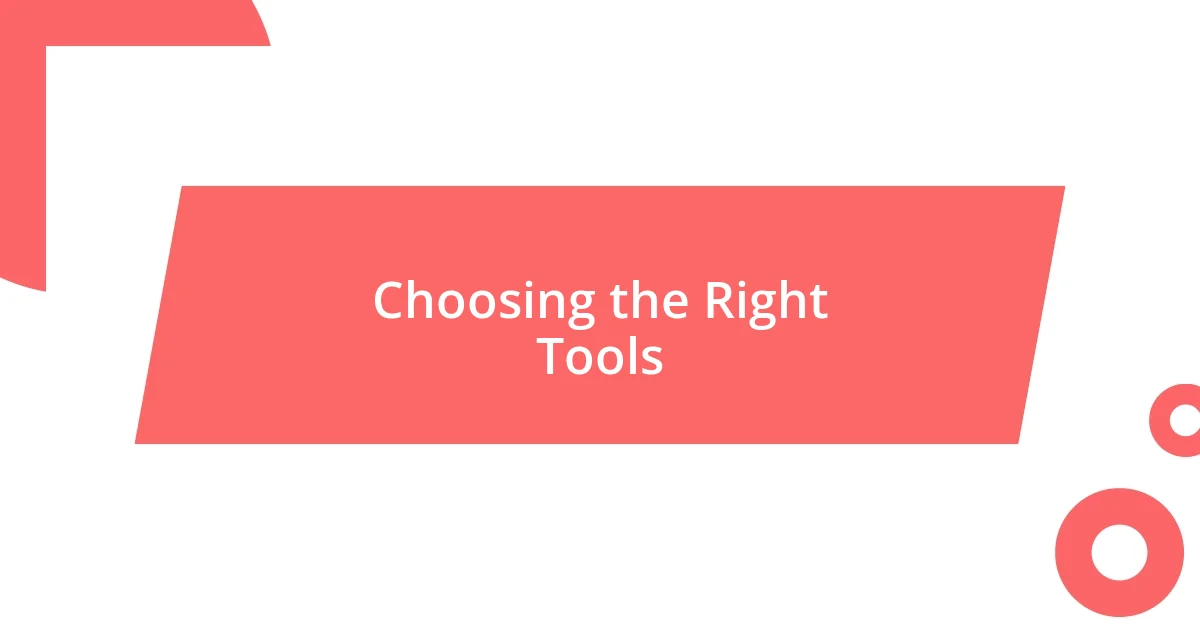
Choosing the Right Tools
Choosing the right tools can truly make or break your modding experience. I vividly recall when I was first overwhelmed by the sheer number of options available. After countless trial-and-error sessions, I learned that selecting user-friendly tools not only saved me time but also made the creative process enjoyable rather than frustrating. Take the time to assess what each tool offers; sometimes, simplicity is the best path forward.
As I dabbled in different modding tools, I found that some suited my creative workflow better than others. For instance, while some tools offer complex scripting capabilities, I leaned toward more intuitive interfaces that let my ideas flow without getting bogged down by technicalities. Have you ever tried using a tool that seemed powerful but just wasn’t right for your project? I have, and it quickly became evident that the right fit can elevate your game creation journey.
When it comes to choosing tools, personal recommendations can be invaluable. I remember talking to other modders in online communities, discovering gems like modding forums where experienced creators share their preferred tools. These insights helped me avoid the pitfalls of tool overload and focus on what truly sparks my creativity. Don’t shy away from reaching out—your next favorite tool could be just a conversation away.
| Tool | Best For |
|---|---|
| GIMP | Image editing for textures |
| Morrowind/Skyrim Creation Kit | Full game modifications |
| Unity Mod Manager | Simplifying mod management |
| OpenIV | Specific game file management |
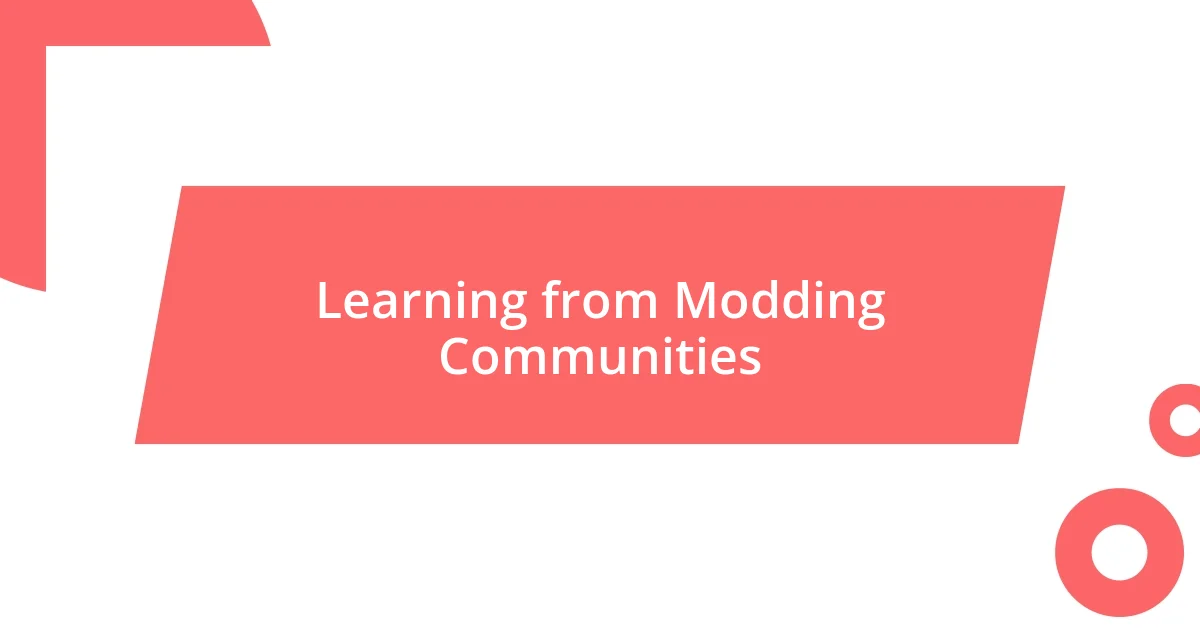
Learning from Modding Communities

Learning from Modding Communities
Engaging with modding communities has been one of the most rewarding aspects of my journey. I still remember the first time I joined an online forum; it felt like stepping into a vibrant marketplace buzzing with creativity and inspiration. The shared enthusiasm was infectious, with members eager to lend help, share tips, and showcase their own projects. That sense of camaraderie opened up a whole new world—suddenly, I wasn’t just a lone creator but part of a larger family passionate about bringing games to life.
The insights I’ve gained from interacting with fellow modders can hardly be overstated. I often found myself revisiting ideas and techniques that I initially overlooked once someone shared their unique perspective. Here are some key takeaways I’ve gathered from these communities:
- Collaborative Learning: Learning from others’ mistakes helps me avoid the same pitfalls.
- Feedback Loop: Constructive criticism can dramatically improve my projects.
- Resource Sharing: Community members often share tools and assets that can save time.
- Inspiration Sources: Seeing what others create sparks new ideas and directions for my work.
- Skill Development: Tutorials and guides offered by experienced modders teach me new skills I hadn’t considered.
Every time I dive into these communities, I feel a genuine connection—the shared experience alone offers a sense of purpose. In a way, it’s like we’re all crafting something greater together, turning our individual sparks of inspiration into a breathtaking tapestry of creativity. It’s that emotional bond and the collective knowledge we share that truly enhances my modding adventures.
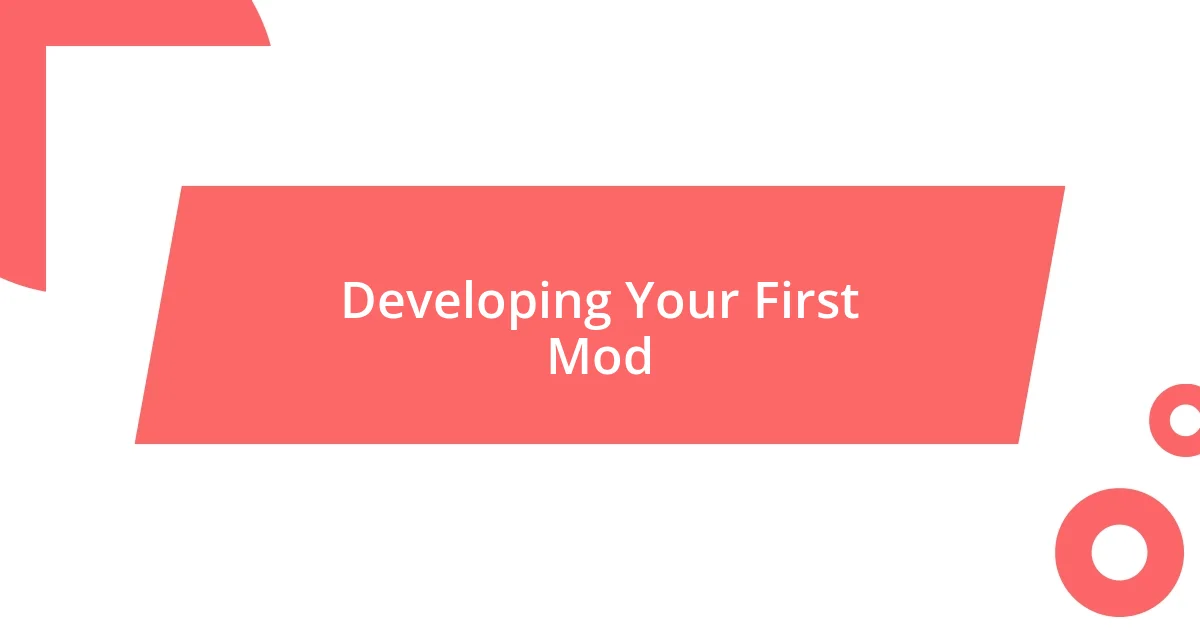
Developing Your First Mod
When I embarked on developing my first mod, I was both excited and nervous. I remember sitting at my desk, staring at my screen, feeling the weight of expectations. But diving in was the best decision I made. I started small—adjusting some character attributes in a simple RPG. This hands-on experience taught me that experimentation is key. Have you ever felt that rush when a small tweak resulted in something surprisingly impactful? It’s a thrill that keeps you coming back for more.
One important lesson I learned was to document my process. Initially, I was too wrapped up in creating and overlooked this crucial step. However, after facing frustrating setbacks, I realized my notes saved me countless hours later on. Jotting down changes and their effects helped me refine my approach. It made me wonder: how often have you fixed a bug only to forget what led you there? Creating a careful record of your journey can transform confusion into clarity.
As I progressed with modding, the fear of making mistakes gradually faded. I came to appreciate that each hiccup—whether a script that wouldn’t run or an asset that wouldn’t load—was a learning opportunity. I vividly recall a time when I thought I had completely broken my mod after adding a new feature. Instead of giving up, I dissected the problem, found the flaw, and ended up with a much better design. This experience helped me embrace a growth mindset, allowing me to look at challenges not as obstacles but as stepping stones on my creative journey.
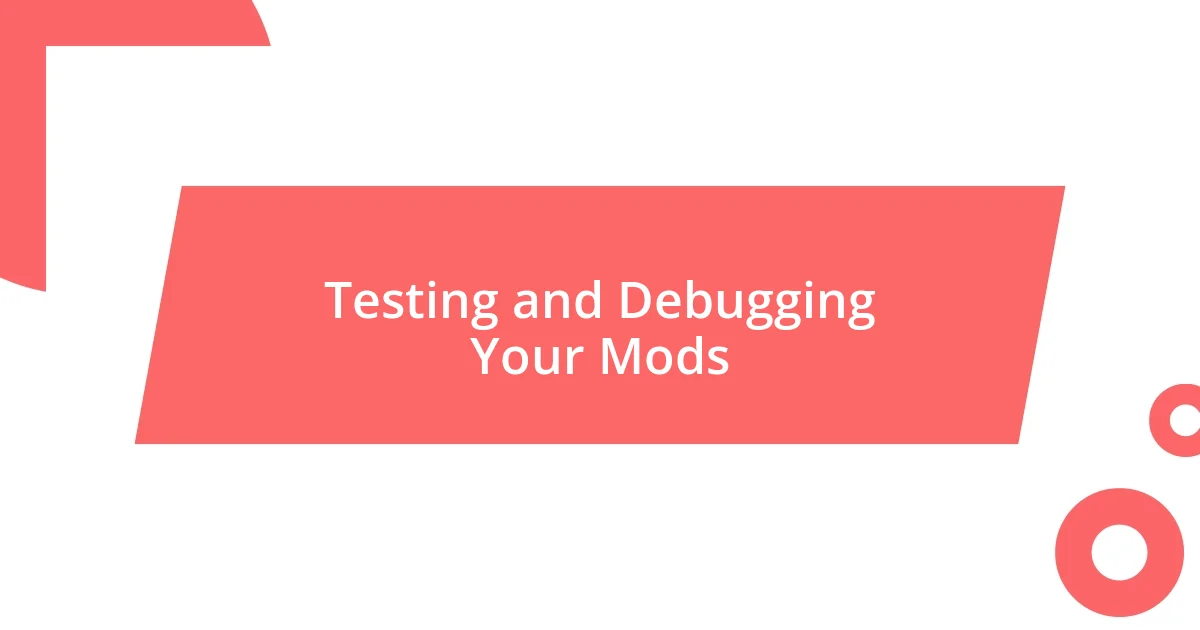
Testing and Debugging Your Mods
When it comes to testing and debugging my mods, I’ve learned that a systematic approach is essential. The first time I encountered a game-breaking bug, I was frustrated beyond belief. I spent hours trying to figure out what went wrong, only to realize I hadn’t isolated the problem effectively. Now, I always start by testing one change at a time. Have you tried this method? It can save so much headache by pinpointing specific issues right away.
I remember one particular instance where I introduced a new quest line in a RPG mod, only to have it crash the game entirely. The panic was real! Instead of spiraling into despair, I took a step back and methodically checked each component. By breaking down the quest into manageable parts, I was able to identify a conflict with the existing scripts. That moment reinforced the importance of patience in debugging—I now see it as an exciting puzzle to solve rather than a chore.
As I debug, I can’t help but feel a sense of accomplishment every time I fix an issue. It’s almost like uncovering hidden treasures within my mod. I also find it invaluable to gather feedback from friends who playtest my mods; they catch things I’ve missed. This collaborative testing phase can be a game-changer. Did you ever wish you had a fresh pair of eyes on your project? It turns out, sometimes the best insights come from people who experience your creation with a clean slate.
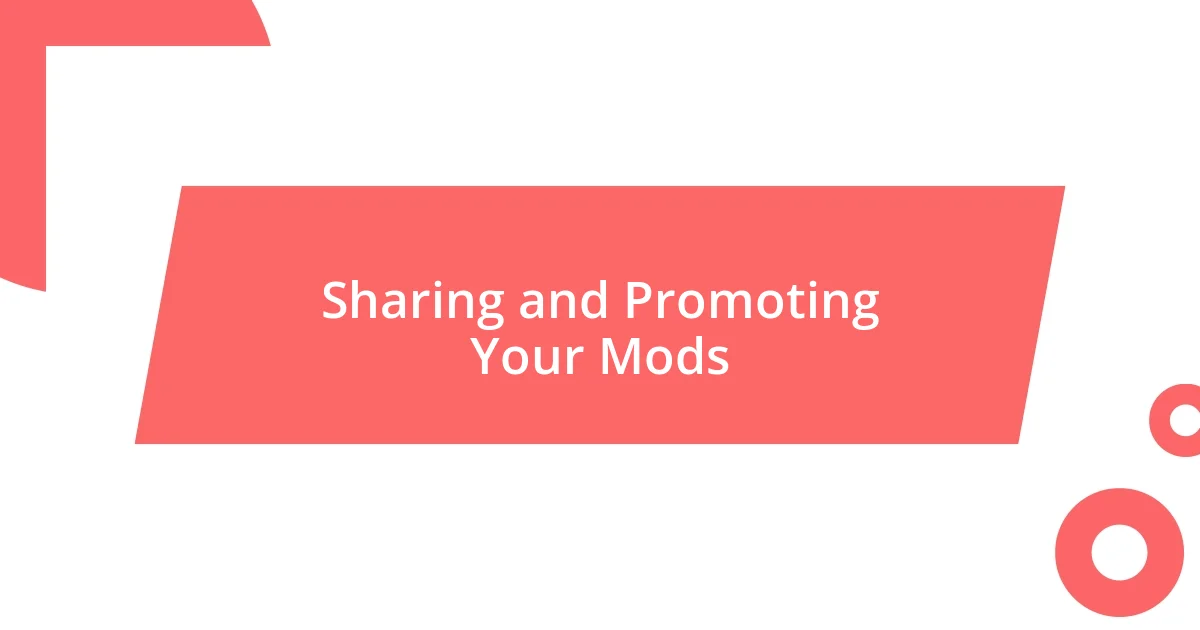
Sharing and Promoting Your Mods
Once my mod was ready, I faced a new challenge: sharing it with the world. I vividly remember the thrill of hitting that “upload” button on a popular modding platform. My heart raced as I waited for the first comments and downloads to roll in. It felt like I was sending my creation out into the vast universe, hoping it would resonate with others. Have you ever felt that blend of excitement and anxiety when exposing your work to public scrutiny? It’s a rollercoaster ride that’s hard to replicate.
Promoting your mod doesn’t just happen automatically; it takes effort. I found that actively engaging with online communities—be it forums, Discord servers, or social media—was crucial. One time, I shared my mod in a niche Reddit community and was blown away by the response. Enthusiastic users not only downloaded it but also offered valuable feedback, with ideas I hadn’t considered before. The sense of camaraderie in the modding community was invigorating. Have you thought about how a simple shared post could bring new life to your work?
Another strategy that worked wonders for me was creating detailed showcase videos. I remember spending an entire weekend filming and editing a walkthrough of my mod, highlighting key features and the story behind its creation. Seeing viewers comment with excitement and intrigue reminded me that storytelling plays a significant role in engaging potential users. Have you considered narrating the journey behind your mod? Sharing your passion can forge stronger connections and entice others to explore your creation.
